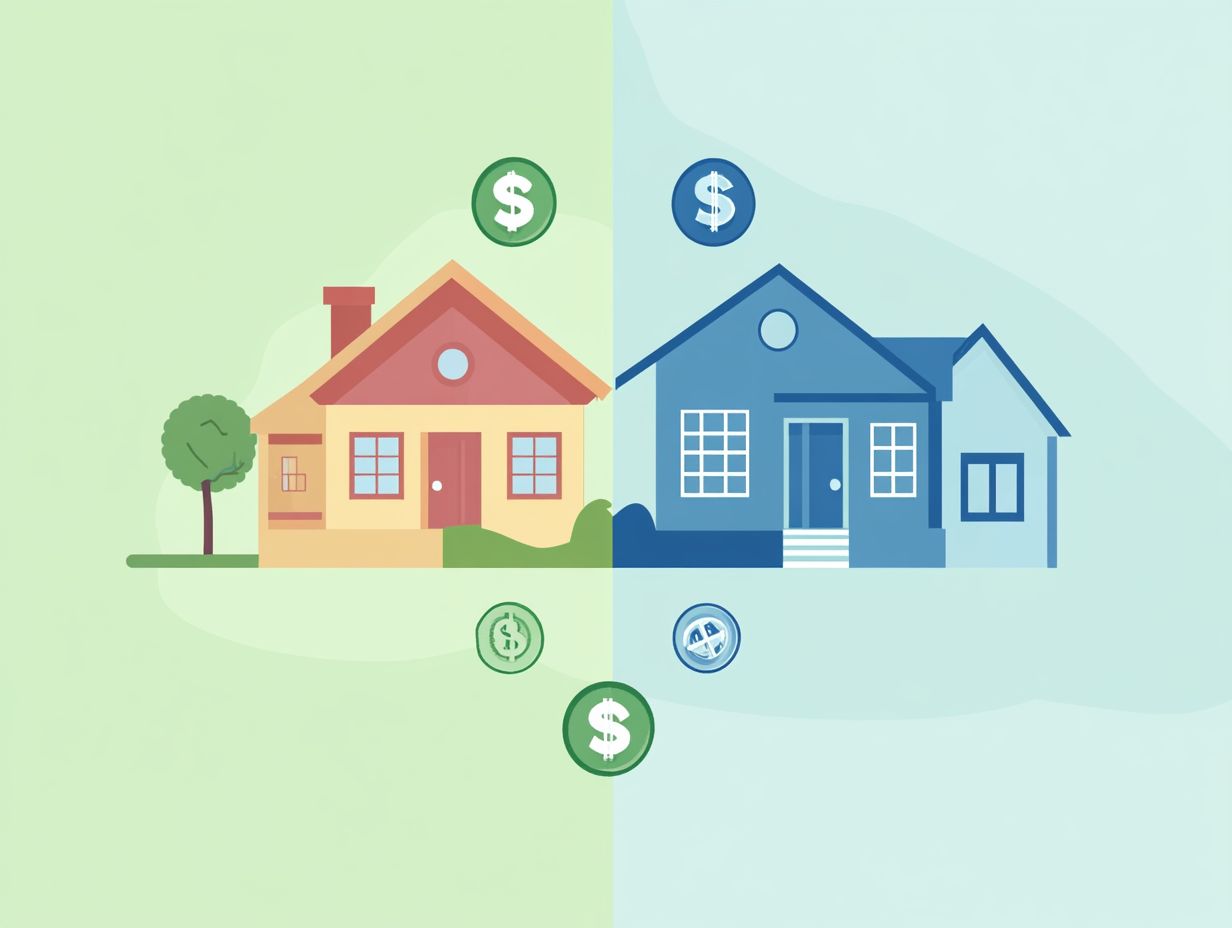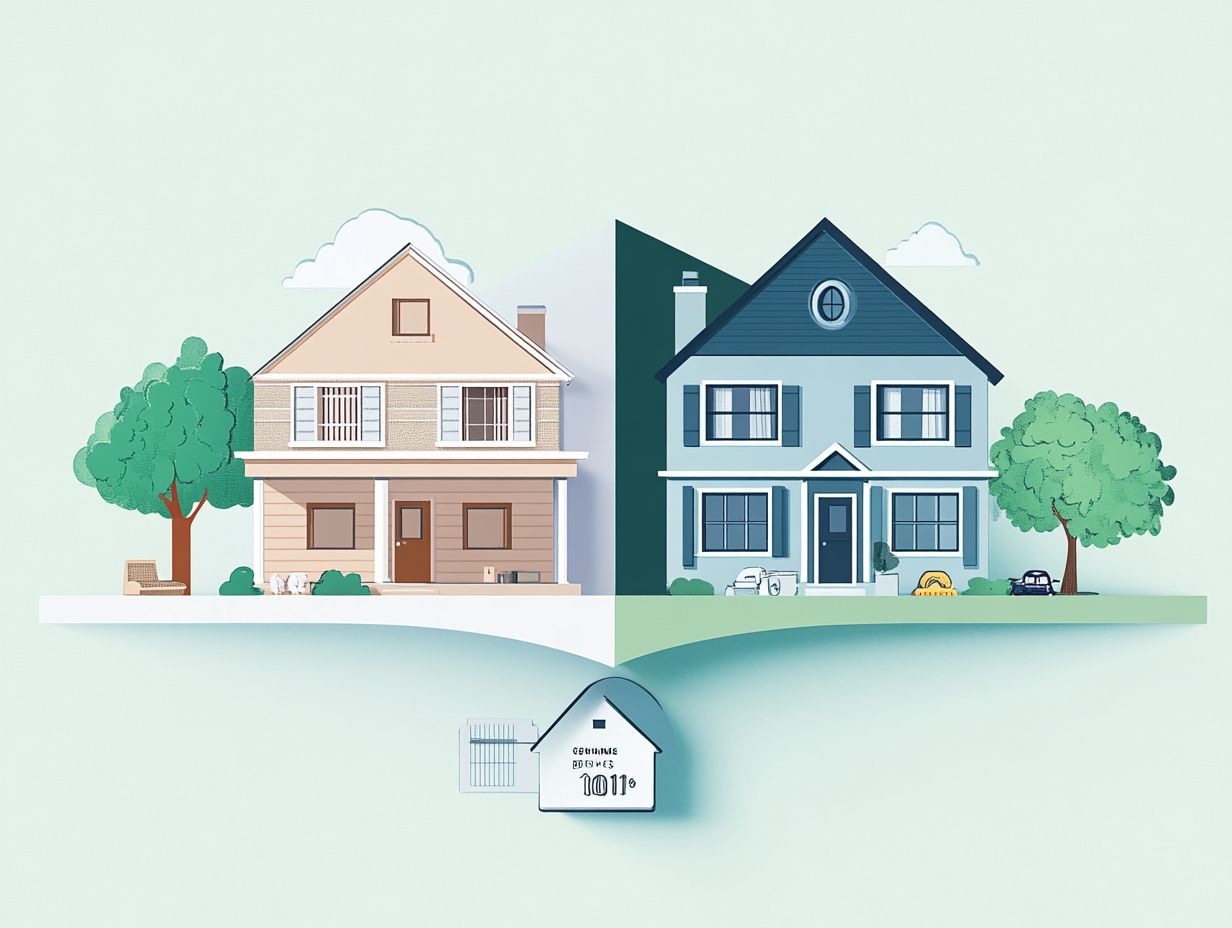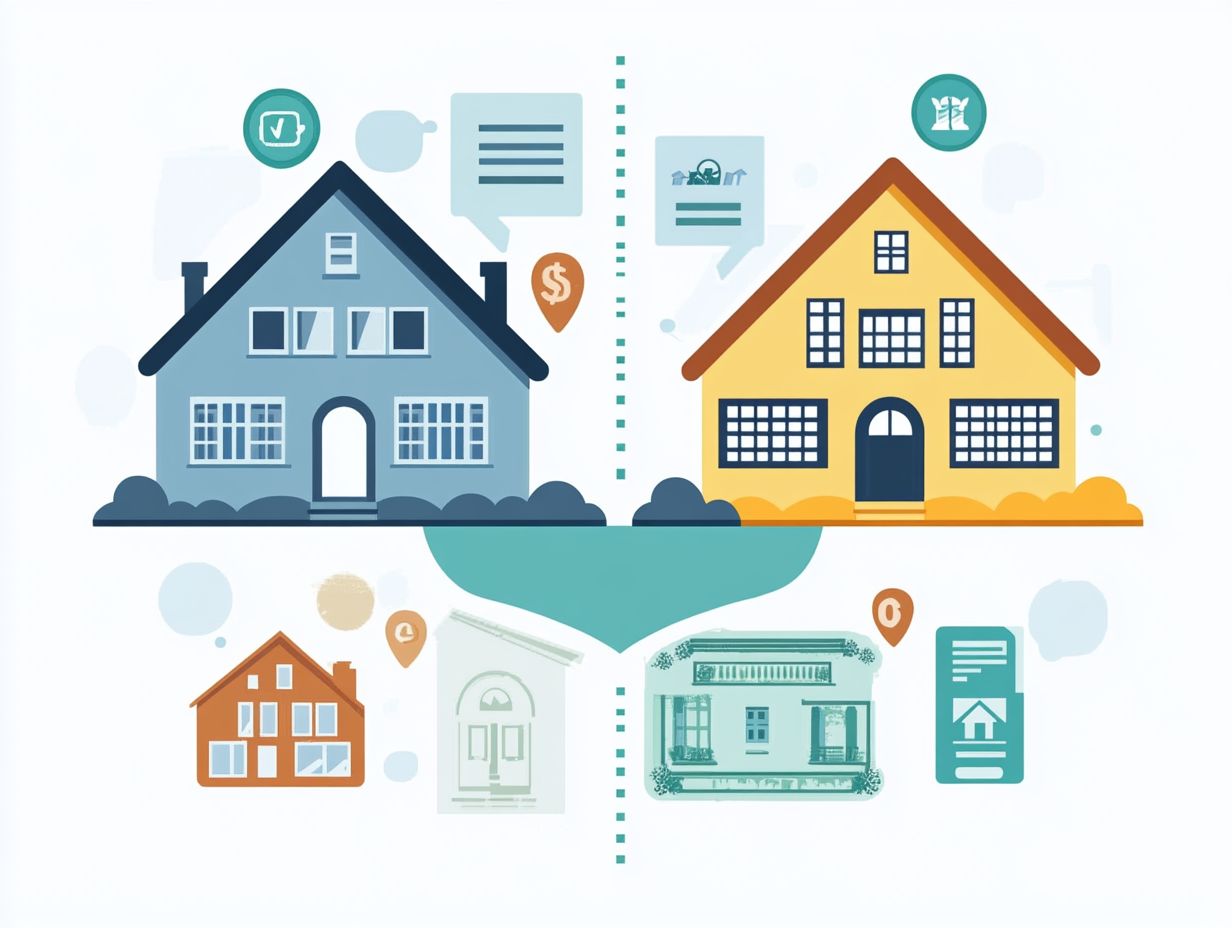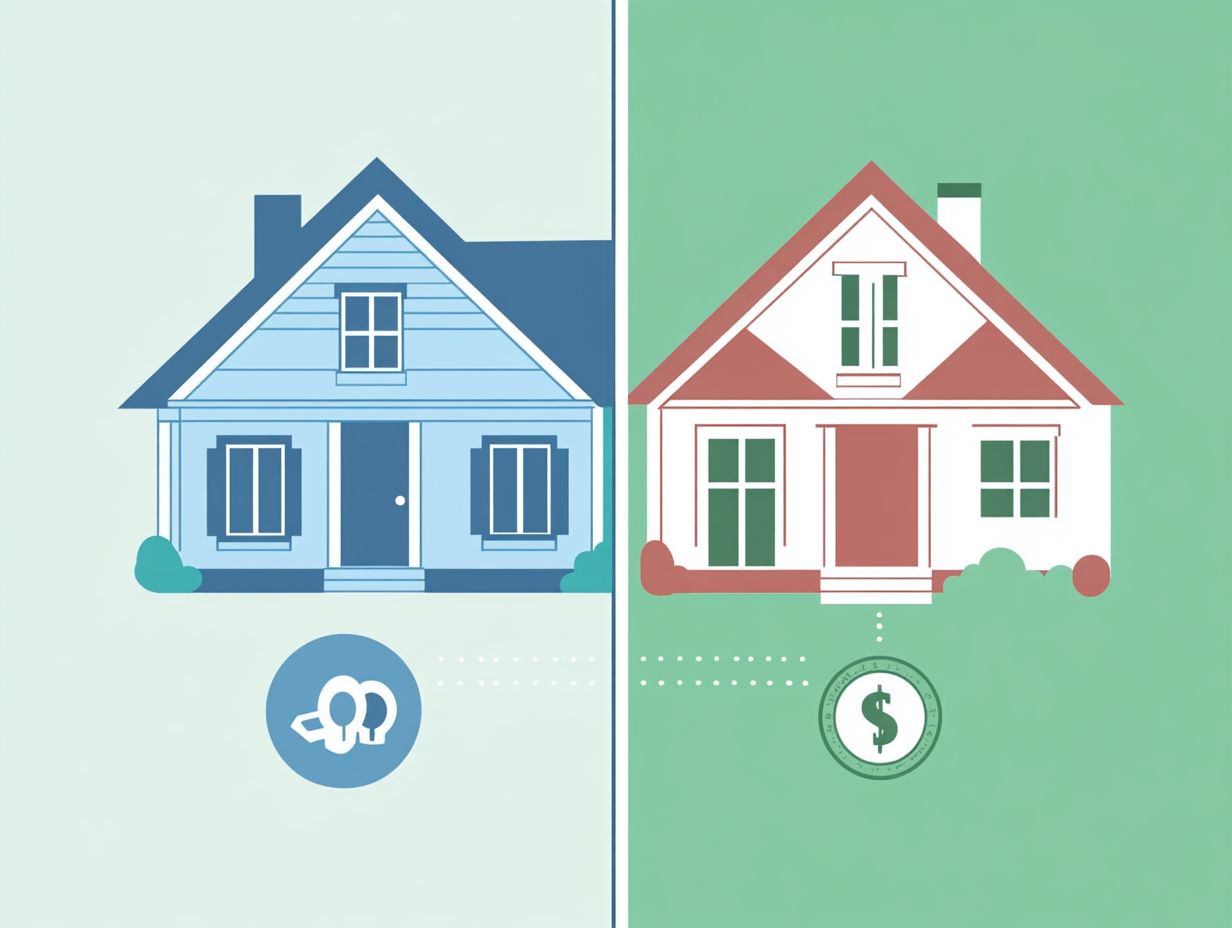Comparing FHA vs. Conventional Loans
When securing financing for your home, understanding the details between FHA and conventional loans can significantly impact your choices.
Both options come with unique features, eligibility requirements, and financial implications that deserve your attention.
This article reveals the key differences and similarities, guiding you through the qualification processes, interest rates, fees, down payment requirements, and loan limits.
Whether you re a first-time buyer or considering refinancing, this comparison equips you with the insights needed to make an informed decision tailored precisely to your needs.
Contents
Key Takeaways:
Here s what you need to know!

FHA loans have more flexible eligibility requirements and lower down payment options compared to conventional loans, making them a good option for first-time homebuyers or those with lower credit scores.
Conventional loans have stricter eligibility requirements, but they offer more options for loan amounts and usually have lower interest rates and fees compared to FHA loans.
When considering FHA vs. conventional loans, it is important to understand the differences in interest rates, fees, and down payment requirements in order to choose the best option for your specific financial situation.
Understanding FHA and Conventional Loans
Knowing the difference between FHA and conventional loans is essential for every homebuyer maneuvering through the intricacies of the housing market.
Each loan type presents unique benefits and challenges designed to accommodate diverse financial profiles and borrower qualifications.
The Federal Housing Administration (FHA) offers government-backed financing options that can be quite appealing. In contrast, conventional loans are typically provided by private lenders, each with its own set of requirements such as down payment amounts and credit scores.
These factors will ultimately influence your loan approval and the terms of your mortgage, making it essential to grasp the details of both options.
Key Differences and Similarities
When you’re weighing the options between FHA loans and conventional loans, it’s important to consider several key differences and similarities, particularly regarding down payment requirements, mortgage insurance, and credit score thresholds.
Both loan types have unique advantages that cater to varying financial circumstances. FHA loans often require a minimum down payment of just 3.5%, making them an appealing choice for first-time buyers or those with limited savings.
Conventional loans typically necessitate a down payment of at least 5% to 20%, influenced by a range of factors.
Mortgage insurance requirements differ significantly. FHA loans come with an upfront mortgage insurance premium, followed by monthly fees. Conventional loans require private mortgage insurance only if the down payment is below 20%.
Credit score benchmarks vary: FHA loans permit scores as low as 580 for optimal rates, whereas conventional loans usually favor scores above 620.
By grasping these details, you can navigate your options more effectively, aligning them with your financial capabilities and long-term objectives.
Qualifying for an FHA Loan

Qualifying for an FHA loan requires a clear understanding of the specific borrower qualifications set forth by the U.S. Department of Housing and Urban Development.
These guidelines ensure that prospective homebuyers meet essential eligibility criteria tailored to diverse financial profiles.
As you navigate this process, you’ll need to assess key factors such as your credit score, the percentage of your monthly income that goes toward paying debts, and your financial history.
Each element plays a crucial role in determining your eligibility and paving the way toward homeownership.
Eligibility Requirements and Application Process
To qualify for FHA loans, you must meet certain criteria, like specific credit score thresholds and essential documentation.
A minimum credit score of 580 is typically needed for a low down payment option. If your score is between 500 and 579, you may still qualify with a higher deposit.
Your debt-to-income ratio should stay below 43%. This shows that you can handle monthly payments while managing debt. Having a steady job for at least two years is also beneficial.
When applying, choose FHA-approved lenders for reliable guidance. Gather key documents like proof of income, tax returns, and bank statements to make the process smoother.
This organized approach simplifies your borrowing experience and boosts your chances of approval!
Qualifying for a Conventional Loan
Qualifying for a conventional loan means understanding various borrower qualifications. These can differ based on lender policies, credit score requirements, and down payment needs.
These factors affect mortgage insurance and loan limits. Unlike FHA loans, conventional loans often require higher credit scores and larger down payments, creating both challenges and opportunities for homebuyers.
Eligibility Requirements for Conventional Loans

Eligibility for conventional loans depends on your credit score, income, and financial stability. These factors influence your application process.
A credit score of at least 620 is typically required. Remember, a higher score can lead to better interest rates! Lenders prefer your debt-to-income ratio to be below 43% to ensure you can handle monthly payments.
A strong financial profile, with steady employment and savings, is crucial for approval. Research and compare different mortgage providers to find the best fit for you.
Submitting a well-prepared application with necessary documents like pay stubs and tax returns increases your chances of success!
Interest Rates and Fees
Interest rates and fees for FHA and conventional loans can significantly affect your homeownership costs. It’s crucial to compare loans to find the best terms.
Key factors like the type of mortgage insurance you ll need, your credit score, and current market conditions influence the mortgage rates you’ll get.
Comparison of Interest Rates and Fees for FHA and Conventional Loans
When comparing interest rates and fees, consider various factors that impact your overall financing costs. These include mortgage insurance, your credit score, and down payment requirements that influence your monthly payments.
FHA loans usually allow for lower credit scores and down payments compared to conventional options. The different rates of mortgage insurance for both types can also affect your overall costs.
Charts or tables can help visualize these comparisons, making it easier for you to evaluate your options and seek expert advice on securing the best rates!
Down Payment Requirements

Down payment requirements differ between FHA and conventional loans. This difference can impact your home buying experience and financial responsibilities.
FHA loans typically offer lower down payments, making them appealing for first-time homebuyers. Conventional loans, on the other hand, may require larger initial payments based on your financial situation and credit history.
Understanding these differences empowers you to make smart choices as you navigate the path to homeownership.
How Much You Need to Put Down for an FHA or Conventional Loan
Determining how much you need to put down for an FHA or conventional loan depends on several factors, including the type of loan and your credit score.
For instance, FHA loans typically allow a lower down payment of around 3.5%, making them attractive for first-time homebuyers who may not have substantial savings. In contrast, conventional loans usually expect you to put down anywhere from 5% to 20%, depending on your financial situation.
The percentage you choose for your down payment can significantly affect your mortgage insurance costs. FHA loans require both an upfront premium and an annual premium, while conventional loans might allow you to avoid private mortgage insurance altogether if you put down 20%.
If you’re keen on minimizing these costs, consider strategies such as exploring grants, establishing a dedicated savings plan, or even making withdrawals from your 401(k). It s also essential to reflect on how various loan limits and geographic factors could influence your overall home affordability.
Loan Limits
Loan limits for FHA loans and conventional loans, set by the U.S. Department of Housing and Urban Development and private lenders, are crucial in determining how much you can borrow.
These limits fluctuate based on factors such as your location, the type of home, and prevailing market conditions. This variability not only highlights the intricacies of the housing market but also shapes the options available to you as a prospective borrower.
Maximum Loan Amounts for FHA and Conventional Loans
When evaluating the maximum loan amounts for FHA and conventional loans, it s crucial to understand the specific loan limits set by various governing bodies and lenders. These limits can greatly affect your purchasing power in the housing market.
These limits can vary significantly based on geographic location. What might be attainable in one area could be out of reach in another. For example, if you’re aiming to buy a home in a high-cost city like San Francisco, you ll typically encounter higher loan limits than someone searching in a rural setting.
The Federal Housing Administration (FHA) recently increased its limit to $1,000,000 in certain markets, reflecting the rising housing costs. In contrast, conventional loans generally adhere to the conforming limits set by Fannie Mae and Freddie Mac, which are around $726,200 for most locations across the U.S.
This means that if you re a prospective homebuyer in a more affordable area, you could discover an amazing budget-friendly home with an FHA loan. However, if you re navigating a more expensive market, you may need to explore conventional financing options to secure a larger loan.
Frequently Asked Questions
- What is the difference between FHA and conventional loans? FHA loans are insured by the Federal Housing Administration, while conventional loans are not insured. This means that FHA loans typically have lower down payment and more lenient credit score requirements.
- Which type of loan is better for first-time homebuyers? FHA loans are often considered a better option due to their lower down payment and flexible credit score requirements. Conventional loans may be more suitable for those with a strong credit history and a larger down payment.
- What is the maximum loan amount for FHA and conventional loans? The maximum loan amount for FHA loans varies by location and is determined by the FHA. For conventional loans, the maximum is typically set by the lender and is based on the borrower’s credit history, income, and other factors.
- Do FHA and conventional loans have different interest rates? Yes, FHA and conventional loans usually have different interest rates. FHA loans may have higher rates due to lower credit score requirements and added costs of FHA mortgage insurance premiums. Conventional loans may have lower rates, especially for borrowers with strong credit.
- Can FHA and conventional loans be used for different types of properties? Both can be used for various properties, including single-family homes, multi-family properties, and condominiums. However, FHA loans may have restrictions on specific types of properties, like manufactured homes.
- Can FHA and conventional loans be used for investment properties? No, FHA loans are only available for primary residences, while conventional loans can be used for investment properties. However, both types may have restrictions on the number of units for investment purposes.
Start your journey today by checking available FHA loan options in your area!






